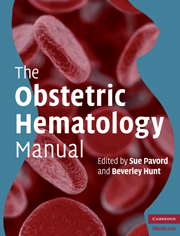Book contents
- The Obstetric Hematology Manual
- The Obstetric Hematology Manual
- Copyright page
- Contents
- Contributors
- Preface
- Acknowledgments
- Section 1 Cellular changes
- Chapter 1 Normal hematological changes during pregnancy and the puerperium
- Chapter 2 Hematinic deficiencies
- Chapter 3 Inherited red cell disorders
- Chapter 4 Maternal autoimmune cytopenias
- Section 2 Feto-maternal alloimmune syndromes
- Section 3 Thromboembolism and anticoagulation
- Section 4 Thrombophilia and fetal loss
- Section 5 Hemorrhagic disorders
- Section 6 Microangiopathies
- Section 7 Malignant conditions
- Index
Chapter 2 - Hematinic deficiencies
from Section 1 - Cellular changes
Published online by Cambridge University Press: 06 December 2010
- The Obstetric Hematology Manual
- The Obstetric Hematology Manual
- Copyright page
- Contents
- Contributors
- Preface
- Acknowledgments
- Section 1 Cellular changes
- Chapter 1 Normal hematological changes during pregnancy and the puerperium
- Chapter 2 Hematinic deficiencies
- Chapter 3 Inherited red cell disorders
- Chapter 4 Maternal autoimmune cytopenias
- Section 2 Feto-maternal alloimmune syndromes
- Section 3 Thromboembolism and anticoagulation
- Section 4 Thrombophilia and fetal loss
- Section 5 Hemorrhagic disorders
- Section 6 Microangiopathies
- Section 7 Malignant conditions
- Index
Summary
- Type
- Chapter
- Information
- The Obstetric Hematology Manual , pp. 13 - 27Publisher: Cambridge University PressPrint publication year: 2010
- 3
- Cited by

